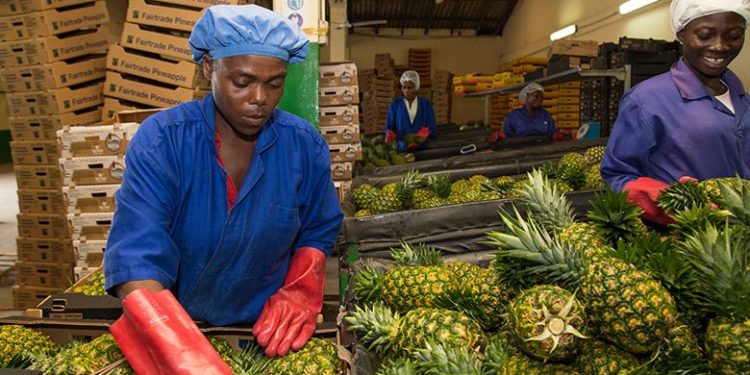A report by the Ghana Statistical Service (GSS) has indicated that only a quarter of agribusiness firms across the country are aware of the much-talked-about African Continental Free Trade Area (AfCFTA) agreement.
The report comes on the back of a previous report – COVID-19 Business Tracker Survey – released by the GSS in December last year which also revealed that a little over twenty-six (26) per cent of all businesses in the country are aware of the AfCFTA trade pact.
In that survey, awareness of the agreement was predominant among large (72.7 pe cent) and medium scale firms (63.8 per cent).
It was however, non-existent among micro and small-scale enterprises in the country.
This is indicative that the clarion call by government to businesses in the country to get on board and benefit from the many advantages of the trade pact has not been clearly heard by Ghanaian businesses.
Per the report, agribusiness firms in the agriculture sector (31.2%) are firms with the least knowledge about AfCFTA, followed by those in the industry sector (23.9%), and the services sector with 23.2% percent.
Read This: Lockdown caused closure of 30.7% agribusiness firms in the country – GSS

According to the June 2021 Summary Report on the Impact of Covid-19 on Agribusinesses in Ghana, agribusiness firms aware of the trade agreement expect six forms of support for their businesses from government in its implementation of the AfCFTA.
The six forms of support noted by the agribusiness firms include; reduced cost of credit, digitization including improved internet connectivity, removing policy/ regulatory bottleneck, formalization including registration, increased information on business opportunities and business advisory services.
Of the six forms of support, the top three supports needed by the agribusinesses are; increase in information on business opportunities (24.7%), reduction in the cost of credit (20.6%), and removing policy or regulatory bottlenecks (16.3%).
The least support expected was digitization including improved internet connectivity of about 5.5%

The African Continent on the back of the implementation of the AfCFTA is now the world’s largest free trade area since the formation of the World Trade Organization (WTO).
Estimates from the Economic Commission for Africa (UNECA) suggest that the AfCFTA covering a market of more than 1.2 billion people, with a Gross Domestic Product (GDP) of $3.4 trillion, has the potential to boost intra-African trade to 52.3 percent.
Meanwhile, the 3-week period-lockdown implemented by government during the height of the pandemic last year, caused the closure of 30.7 percent or 42,396 agribusiness firms in the country.
Of the 42,396 agribusiness firms closed down during the lockdown period, closure of 20.9 percent or 8,860 agribusiness firms were directly due to the lockdown, with the lockdown facilitating or enabling the closure of the remaining 33,536 agribusiness firms.
According to the GSS, an estimated 16,091 agribusiness firms representing 11.6 percent of agribusinesses in the country closed down due to the lockdown, still remained closed after the lifting of the lockdown measures.
Per the report, agribusiness firms in the service and industry sectors were most affected by the lockdown compared with agribusiness firms in the agriculture sector, adding that agribusiness firms in the services sector were however, the first to experience recovery with the most reopened firms.
The closure of agribusinesses in the country due to the impact of the Covid-19 pandemic, the report notes further, resulted in the layoffs of some 51,111 employees, with the number of laid off employees increasing to 78,412 in the post-lockdown period.
Also, workers with reduced wages increased from 175,255 during the lockdown to 267,211 in the post lockdown period.








